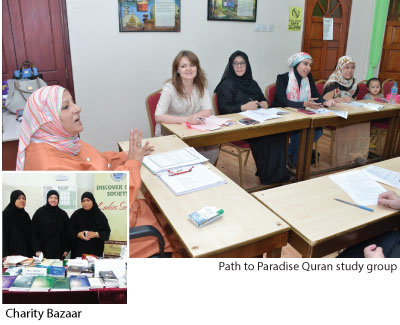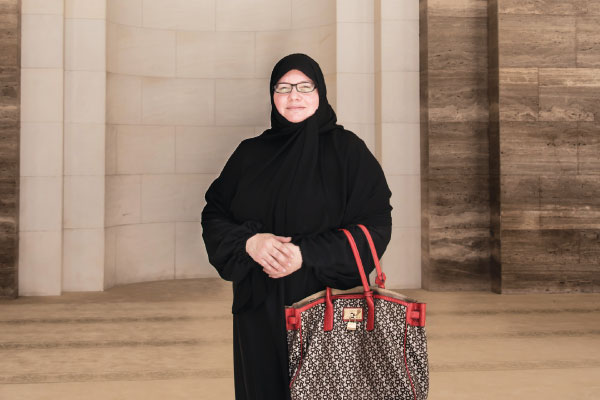Chile-born California-raised Renata Santibanez embraced Islam while she was at university in the United States. Thirty years on, she gives us an insight into a life lived by faith and the power of informed choices.
Having lived in Bahrain since 1984, Renata Santibanez has completely shed off her American accent. In a departure from the average Western lifestyle in Bahrain, she leads a simple life, raising her children (without employing house help) and devoting most of her free time to volunteer work.
As many regulars at Discover Islam will attest, the manager of the organisation’s ladies’ section is an approachable woman known for her sympathetic ear and sound advice. When it comes to community work and charity, Renata’s altruism can see opportunities where most people can’t. We sit down with her to dwell into her perspective on Islam and its way of life.
Woman This Month (WTM): How did you come across this path?
Renata Santibanez (RS): I was in the eighth grade in California when they showed us a film at school about different religions. It was interesting because until that point, I hadn’t heard of any religion other than Christianity.
Later at University, I came across Muslims for the first time and started wondering about the faith. Out of curiosity, I went to the library and read books on Islam. I realised that the more I read, the happier I became and read even more. I’m still reading today.
WTM: What was the defining moment for you?
RS: Well, there wasn’t really a dramatic moment that impelled me. I was studying books on Islam and found its principles very appealing. It was all about being good to the family and others, and about being kind to animals and the environment.
Finally, I came across a book which said that those interested in becoming a Muslim have to read the testimony. I was in my twenties; I wanted to do it and it felt right. So I read the testimony and that’s it. I have no regrets.
WTM: What brought you to Bahrain?
RS: I met my husband at university in California. He is Bahraini. We got married, finished our studies and moved here in 1984. You can say destiny played its part.
WTM: When did you join Discover Islam?
 RS: After coming to Bahrain, I wanted to meet other ladies in order to share ideas and continue my educational goals as well as socialise.
RS: After coming to Bahrain, I wanted to meet other ladies in order to share ideas and continue my educational goals as well as socialise.
I found classes run by Bahraini ladies, which gave an introduction to the religion; this was in Discover Islam. Since then, I have been associated with this organisation.
WTM: As a Western woman, was it hard for you to adapt to the changes in lifestyle, especially the mode of dress?
RS: Not really, because it was my decision. Once you’ve taken a decision and if it’s an informed choice, you know what it entails. And then you adjust to the lifestyle naturally. I think my hardship lay in responding to so many people who kept asking me, ‘why’? (laughs)
WTM: We’re coming to that. How did your family and friends respond to this move?
RS: I was raised in a very cosmopolitan environment and my parents had friends all over the world. They told me, ‘If you’re making a decision that you know well and are happy with, it’s fine with us’.
The Holy Quran says there’s no compulsion in matters of religion. Everybody has the right to their beliefs.
WTM: What’s your role as manager at Discover Islam?
RS: We provide information on Islam to anyone who asks for it, whether it’s through books, attending classes, people dropping in to ask questions, or queries over the phone or by email. I believe we offer a nurturing environment, where everyone is welcome, irrespective of faith.
WTM: What are the chances of people converting to this faith after visiting your centres?
RS: As Muslims, we believe that the issue of conversion is with the true one God alone. Yes, we can provide books, lessons and information on Islam, but in the end, each individual has the right to choose their belief.
WTM: There is a worldwide debate on the issue of women wearing the hijab. What’s your take on this?
RS: Modesty is important in any religion. Nuns of the Christian faith and other faiths observe it; even my late grandmother wore a veil to church. As Muslim women, we believe in dressing modestly in public. However, we also believe in personal freedom.
As such, you can wear any colour and style of clothing so long as it adheres to the basic rules and guidelines.
WTM: What do you think of the challenges that Muslims today, given the prejudice they face?
RS: For me, the challenge lies in projecting the correct image of Islam when there are many misconceptions.
One thing is clear: Islam has empowered women since the very beginning. Islamic history demonstrates the equality that women enjoyed — on a personal, community or national level. Therefore, it’s important for Muslims as well as people of other faiths to read and educate themselves about Islam.


































